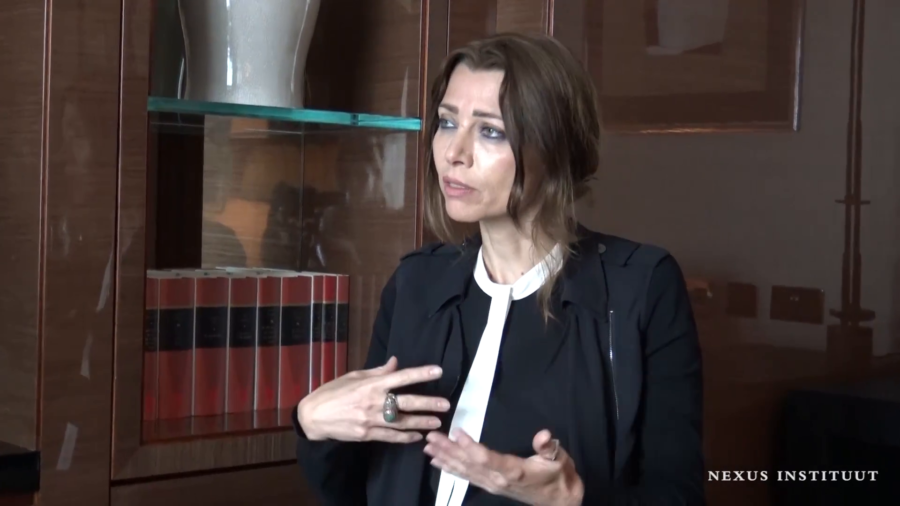Rob Riemen: Elif, welcome. It’s so good to see you here in London. In a couple of months we’ll meet again in Amsterdam, as you are one of the speakers for our conference “What Will Save the World?” Would you please be so kind [as] to introduce yourself to the Dutch audience? You’re a cosmopolitan, you’re a novelist. Maybe you can tell us a little bit about yourself.
Elif Şafak: Yeah, with pleasure. I am a writer, I’m a novelist, I’m a storyteller. That’s how I connect with the world, through stories and through imagination. That said, I also have an academic background, an interdisciplinary background. I was educated in international relations. Then I’ve done a Master’s degree in women’s studies. And then for a PhD, political science or political philosophy. And I have always kept my connection with academia throughout the years. I’m also a public speaker and commentator on various issues that I think are important in the world today, so I do write for various publications around the world.
To me, all of that is… They’re all in harmony, but at the same time maybe there is a gap, because by nature I am an introvert. As a writer, my job is based on solitude. But, I also have this other side that likes to engage in public debates and likes to think about the issues that matter today.
Riemen: One of the gifts of being a writer, the power of imagination. And you have a huge power of imagination. Everybody knows, who have read your books. But when you look at nowaday’s world as a writer, now what is it that you see?
Şafak: Well, I see lots of signs that I find quite alarming. Maybe I’m a Gramscian in that regard. I always shared his pessimism of the intellect and the optimism of the will, optimism of the heart. So I’m half pessimistic, half optimistic.
I am half pessimistic because, when I look at the signs today, I see a very strong trend back to what I call tribalism, back to nation-states, nationalism, religiosity, all those divisive forces that many intellectuals in the 1940s, ’50s, thought were going to disappear gradually. That did not happen. In fact, the opposite happened. They’ve made a very strong comeback. So, religion is a major factor today. Nationalism indeed so. But also this tribalism dividing humanity on the basis of imaginary categories.
I’m half optimistic when I look at the people, global souls. I’m a big believer in cosmopolitanism. I’m a big believer in the truth that in this world if we’re ever going to learn anything, we will learn it from people who are different from us. I have nothing to learn from someone who is exactly like me, who thinks exactly like me. But someone who’s different will challenge me, and perhaps I’ll challenge him, too. So that diversity, that cosmopolitanism that we are belittling today is something that we need to renew. And also I believe in the power of humanism, empathy, in the role of empathy on which the art of storytelling is very much based.
Riemen: But then the question is—and we will of discuss it of course lengthily at the conference. But the big question is, what happened? After World War II, we built our international institutions like the United Nations. And we have wonderful NGOs like Human Rights Watch, Amnesty International. We became more prosperous. There’s huge development in technology, science. And then the fall of the Berlin Wall. There was a huge sense of optimism in the early 90s. So how come, do you think, that we now have this backward tendency?
Şafak: Yeah. There was indeed a huge wave, tide, of optimism in the sense that many smart intellectuals, they thought that thanks to globalization we were all going to become a big global village and everybody would have primarily economic and social ties, and that would help to transcend national and nationalistic boundaries.
It did not happen in that way. I think we need to bear in mind that, when we think about time, we tend to think that time always goes in a linear direction. But, we have seen that time does not always go forward; it sometimes it draws circles; it can move backwards. In other words, what I’m trying to say is if we learn nothing from the mistakes of the past, we are bound to make those mistakes again and again and again. And that is what is so sad, how memory is lost.
And I’m not talking about very long-term memory of centuries. I’m talking about recent political memory, even with regards to Europe, the EU. How it was established. How the journey began. Very few people today are talking about the beginning, that spirit that initiated everything. So we tend to take things for granted very easily. And I find myself in this a bit ironic situation, to tell you the truth, because coming from Turkey, a country that’s on the fringes of Europe (and I live in the UK), I find myself defending more passionately what I regard as European values.
For me, the EU is not primarily a financial project or an economic project. It’s primarily about values, which mean a lot to me. And by those values I mean freedom of speech primarily, separation of powers, rule of law, definitely women’s rights, LGBT rights, minority rights, and many other human rights that all together make sense. So I do not take these values for granted because I do know that societies can lose them. Neither do I take cosmopolitanism for granted, because I come from a country that has lost its cosmopolitan heritage, and I think that by losing that, Turkey lost a lot.
Further Reference
Nexus Conference 2016, “What Will Save the World?”
